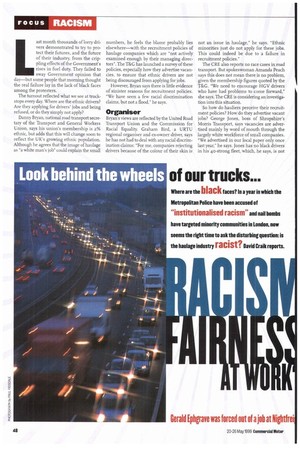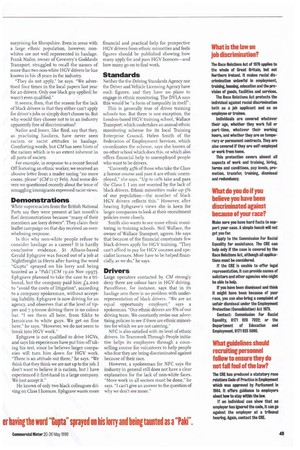Where are the black faces? In a year in which
Page 50

Page 51

If you've noticed an error in this article please click here to report it so we can fix it.
the Metropolitan Police have been accused of "institutionalised racism" and nail bombs have targeted minority communities in London, now seems the right time to ask the disturbing question: is the haulage industry racist? David Craik reports. Last month thousands of lorry drivers demonstrated to try to protect their futures, and the future of their industry, from the crippling effects of the Government's rises in fuel duty. They failed to sway Government opinion that day—but some people that morning thought the real failure lay in the lack of black faces among the protesters.
The turnout reflected what we see at truckstops every day. Where are the ethnic drivers? Are they applying for drivers' jobs and being refused, or do they simply not apply?
Danny Bryan, national road transport secretary of the Transport and General Workers Union, says his union's membership is 2% ethnic, but adds that this will change soon to reflect the UK's growing ethnic population. Although he agrees that the image of haulage as "a white man's job" could explain the small numbers, he feels the blame probably lies elsewhere—with the recruitment policies of haulage companies which are "not actively examined enough by their managing directors". The T&G has launched a survey of these policies, especially how they advertise vacancies, to ensure that ethnic drivers are not being discouraged from applying for jobs.
However, Bryan says there is little evidence of sinister reasons for recruitment policies. "We have seen a few racial discrimination claims, but not a flood," he says.
Organiser
Bryan's views are reflected by the United Road Transport Union and the Commission for Racial Equality. Graham Bird, a URTU regional organiser and ex-owner driver, says he has not had to deal with any racial discrimination claims: "For me, companies rejecting drivers because of the colour of their skin is not an issue in haulage," he says. "Ethnic minorities just do not apply for these jobs. This could indeed be due to a failure in recruitment policies."
The CR E also reports no race cases in road transport. But spokeswoman Amanda Peach says this does not mean there is no problem, given the membership figures quoted by the T&G. "We need to encourage HGV drivers who have had problems to come forward," she says. The CRE is considering an investigation into this situation.
So how do hauliers perceive their recruitment policies? How do they advertise vacant jobs? George Jones, boss of Shropshire's Morris Transport, says vacancies are advertised mainly by word of mouth through the largely white workforce of small companies. "We advertised in our local paper only once last year," he says. Jones has no black drivers in his 40-strong fleet, which, he says, is not surprising for Shropshire. Even in areas with a large ethnic population, however, nonwhites are not well represented in haulage. Frank Nailor, owner of Coventry's Goddards Transport, struggled to recall the names of more than two non-white HGV drivers he has known in his 18 years in the industry.
"They do not apply," he says. "We advertised four times in the local papers last year for 20 drivers. Only one black guy applied; he wasn't even qualified."
It seems, then, that the reason for the lack of black drivers is that they either can't apply for driver's jobs or simply don't choose to. But why would they choose not to in an industry apparently free of discrimination?
Nailor and Jones, like Bird, say that they, as practising hauliers, have never seen racism or racist attitudes in haulage. Comforting words, but CM has seen hints of the racism which is to an extent inherent in all parts of society.
For example, in response to a recent Sound Off featuring an ethnic worker, we received an abusive letter from a reader saying "no more coons, please" (CM 11-17 Feb). And some drivers we questioned recently about the issue of smuggling immigrants expressed racist views.
Demonstrations
White supremacists from the British National Party say they were present at last month's fuel demonstrations because "many of their members are lorry drivers". They claim their leaflet campaign on that day received an overwhelming response.
Is this why non-white people refuse to consider haulage as a career? It is hardly conclusive evidence. St Albans-based Gerald Ephgrave was forced out of a job at Nightfreight in Herts after having the word "Gupta" sprayed on his lorry and being taunted as a " Paki"( CM 13-20 Nov 1997). Ephgrave planned to take the case to a tribunal, but the company paid him £2,000 to "avoid the costs of litigation", according to a company spokesman, without accepting liability. Ephgrave is now driving for an agency, and observes that at the level of tipper and 7.5-tonne driving there is no colour bar. "I see them all here, from Sikhs to Jamaicans to white guys. We get on fine here," he says. "However, we do not seem to break into HGV work."
Ephgrave is not qualified to drive HGVs, and says his experiences have put him ofFtaking his test, since he believes larger companies will turn him down for HGV work. "There is an attitude out there," he says. "We think that they think we are not up to the job. I don't want to believe it is racism, but I have experienced it first-hand in a large company. We just accept it."
He knows of only two black colleagues driving on Class I licences. Ephgrave wants more financial and practical help for prospective HGV drivers from ethnic minorities and feels figures should be published showing how many apply for and pass HGV licences—and how many go on to find work.
Standards
Neither the the Driving Standards Agency nor the Driver and Vehicle Licensing Agency have such figures, and they have no plans to engage in ethnic monitoring. The DVLA says this would be "a form of inequality in itself".
This is generally true of driver training schools too. But there is one exception, the London-based HGV training school, Wallace Transport, which undertakes an annual ethnic monitoring scheme for its local Training Enterprise Council. Helen Smith of the Federation of Employment Services, which co-ordinates the scheme, says she knows of no other school which does this, or which also offers financial help to unemployed people who want to be drivers.
"Currently 45% of those who take the Class 2 licence course and pass it are ethnic unemployed," she says. "Up to to% take and pass the Class I. I am not worried by the lack of black drivers. Ethnic minorities make up 5% of our population—the number of black HGV drivers reflects this." However, after hearing Ephgrave's views she is keen for larger companies to look at their recruitment policies more closely.
Smith also wants to see more ethnic monitoring in training schools. Neil Wallace, the owner of Wallace Transport, agrees. He says that because of the financial constraints few black drivers apply for FIGV training. "They can't afford to pay for lTGV courses and specialist licences. More have to be helped financially, as we do," he says,
Drivers
Large operators contacted by CM strongly deny there are colour bars in HGV driving, Parcelforce, for instance, says that in its haulage arm there is no problem with underrepresentation of black drivers. "We are an equal opportunity employer," says a spokesman. "Our ethnic drivers are 8% of our driving team. We constantly revise our advertising policies to see if there are ethnic minorities for which we are not catering."
NFC is also satisfied with its level of ethnic drivers. Its Teamwork Through People initiative helps its employees through a counselling course for volunteers to help people who fear they are being discriminated against because of their race.
However, a spokesman for NFC says the industry in general still does not have a clear explanation for the lack of non-white faces. "More work in all sectors must be done," he says. "I can't give an answer to the question of why we don't see more."
What is the law on job discrimination?
The Race Relations Act of 1976 applies to the whole of Great Britain, but not Northern Ireland. It makes racial discrimination unlawful in employment, training, housing, education and the provision of goods, facilities and services.
The Race Relations Act protects the individual against racial discrimination both as a job applicant and as an employee or trainee.
Individuals are covered whatever their age, whether they work full or part-time, whatever their working hours, and whether they are on temporary or permanent contracts. They are also covered if they are self-employed or work from home.
This protection covers almost all aspects of work and training, hiring, terms and conditions, pay levels, promotion, transfer, training, dismissal and redundancy.
What do you do if you believe you have been discriminated against because of your race?
Make sure you have hard facts to support your case. A simple hunch will not get you far.
Apply to the Commission For Racial Equality for assistance. The CRE can help only if the case is covered by the Race Relations Act, although all applications must be considered.
If the CRE is unable to offer legal representation, it can provide names of solicitors and other agencies who might be able to help.
If you have been dismissed and think it might have been because of your race, you can also bring a complaint of unfair dismissal under the Employment Protection (Consolidation) Act 1978.
Contact: Commission For Racial Equality, 0171 828 7022; or the Department of Education and Employment, 0171 925 5000.
What guidelines should recruiting personnel follow to ensure they do not fall foul of the law?
The CRE has produced a statutory race relations Cade of Practice in Employment which was approved by Parliament in 1984. It offers guidance to employers about how to stay within the law.
If an individual can show that an employer has ignored the code, it can go against the employer at a tribunal hearing. Again, contact the ORE.




















































































































